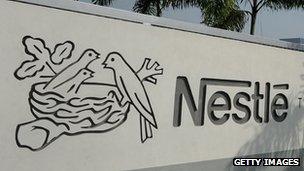Nestle removes beef pasta meals after finding horsemeat
- Published

Nestle, the world's biggest food company, has removed beef pasta meals from shelves in Italy and Spain after tests revealed traces of horse DNA.
The Swiss-based firm has halted deliveries of products containing meat from a German supplier.
Nestle is the latest in a string of major food producers to find traces of horsemeat in beef meals.
A spokesman for the company said levels of horse DNA were very low but above 1%.
Nestle has also tested samples of all of its processed beef products sold in the UK and Ireland, which were found to not contain any presence of horse DNA.
These items consisted of seven Jenny Craig products and two Gerber baby food products.
Last week the firm had said its products did not contain horsemeat.
Nestle withdrew two chilled pasta products, Buitoni Beef Ravioli and Beef Tortellini, in Italy and Spain.
Lasagnes a la Bolognaise Gourmandes, a frozen product for catering businesses produced in France, will also be withdrawn.
A spokesman for the company told the BBC that Nestle had identified a problem with a supplier from Germany.
'New tests'
A statement on the Nestle website, external identified the supplier as HJ Schypke, a sub-contractor of JBS Toledo, a major meat processing company based in Belgium.
"There is no food safety issue, but the mislabelling of products means they fail to meet the very high standards consumers expect from us," the statement said.
In addition to removing the three affected products from sale, Nestle would be "enhancing our existing comprehensive quality assurance programme by adding new tests on beef for horse DNA prior to production in Europe", it added.
The BBC's Imogen Foulkes in Geneva says the news that the world's biggest food producer is now having to withdraw some foods, shows the problem is far wider than previously thought and, critics say, how dangerously unregulated the food industry has become.
The widening scandal over mislabelled horsemeat has affected at least 12 European countries, including Switzerland, where the retailer Co-op - famous for its broad range of organic, locally-sourced food - was on Monday forced to remove nine different products from its shelves.
Last Wednesday, the company said it had found horsemeat in its own-brand frozen lasagne produced by the Comigel food processing company in France.
Co-op now faces possible charges of negligence from the Swiss authorities.
France meanwhile partially lifted a production ban for another meat processing firm, Spanghero.
The French government revoked its licence last week over suspicions that Spanghero knowingly sold horsemeat labelled as beef, an allegation the company rejects.
The French authorities said that unwitting workers should not be penalised.
As a result the firm will be allowed to produce minced meat, sausages and ready-to-eat meals, but not to stock frozen meat.
Meanwhile the UK and Germany have also both pledged to step up testing of frozen food products.